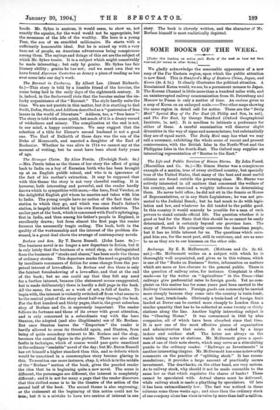Borlase and Son. By T. Baron Russell. (John Lane. Os.)—
The business novel is no longer a new departure in fiction, but it is only lately that the business of a retail shop, as distinguished from the business of "stocks and shares," has been made the theme of ordinary stories. This departure marks the need so greatly felt by inordinate consumers of fiction for some change from the per- petual interest of love-affairs. In Borlase and Son there is only the faintest foreshadowing of a love-affair, and that at the end of the book; but no one could say that they felt any need for a further interest, because (the statement seems exaggerated, but is made deliberately) there is hardly a dull page in the book. All the same, the novel, as a work of art, is full of faults. To begin with, the interest is violently switched off from what seems to be the central point of the story about half-way through the book. For the first hundred and thirty pages, that is, the great suburban shop of Borlase and Co. is supremely important. The reader follows its fortunes and those of its owner with great attention, and is only concerned in a subordinate way with the hero Stanton, the adopted (and also illegitimate) son of Mr. Borlase. But once Stanton leaves the "Emporium" the reader is hardly allowed to cross its threshold again, and Stanton, from being of quite secondary interest to Mr. Borlase and the shop, becomes the central figure in the picture. There are also other faults in technique, which of course would pass quite unnoticed in the ordinary "readable" novel of the day; but Mr. Baron Russell has set himself a higher standard than this, and so defects which would be unnoticed in a commonplace story become glaring in this. To mention one more instance, chap. 5, which is in the middle of the " Borlase " section of the book, gives the puzzled reader the idea that he is beginning quite a new novel. The scene is different, the personages are different, the interest is completely different; and it is not for many a page that the reader discovers that this shifted scene is to be the theatre of the action of the second half of the book. The second theme is also engrossing, or the statement at the beginning of this notice could not be true; but it is a mistake to have two centres of interest in one
story. The book is cleverly written, and the character of Mr. Borlase himself is most realistically depicted.






















































 Previous page
Previous page